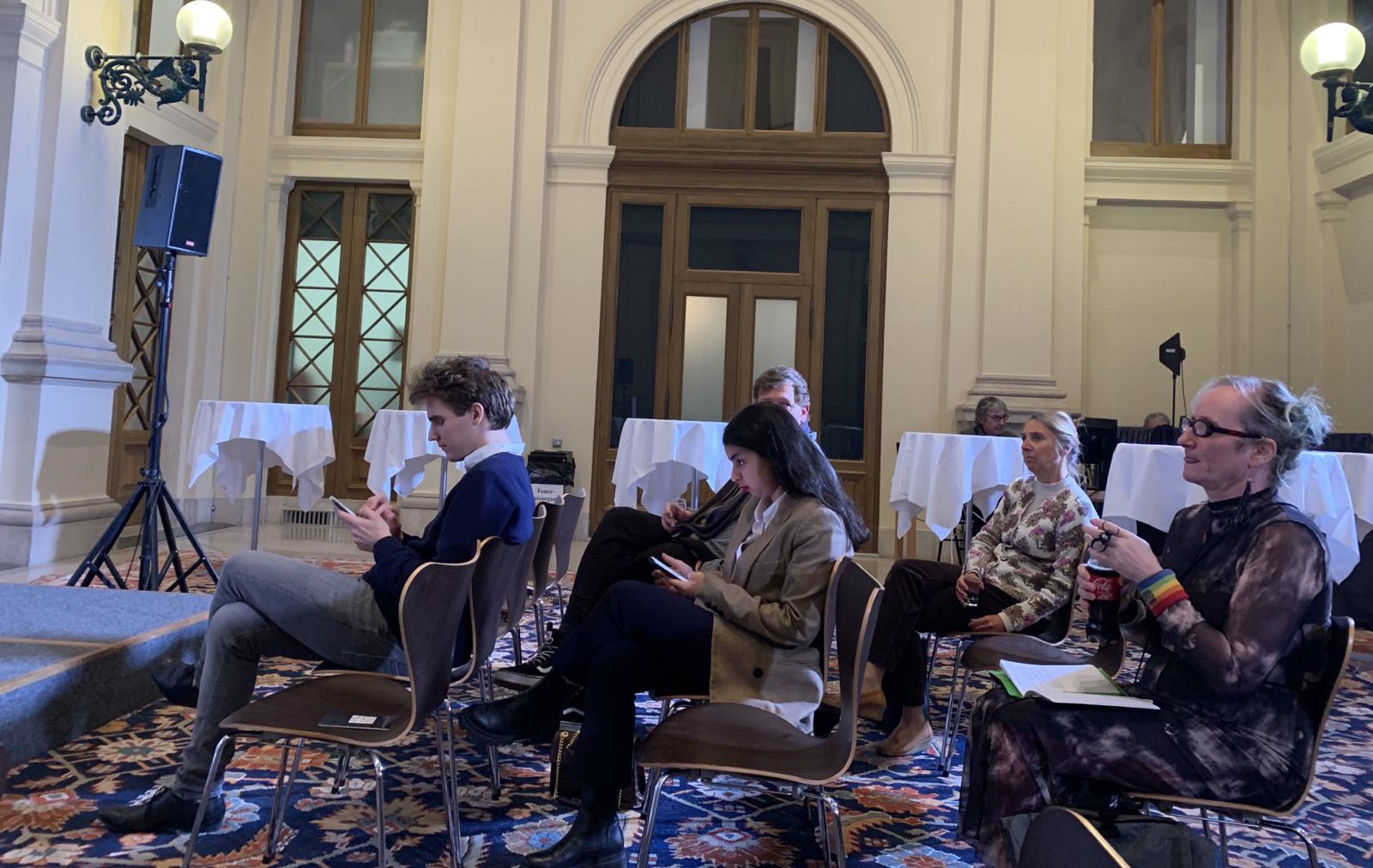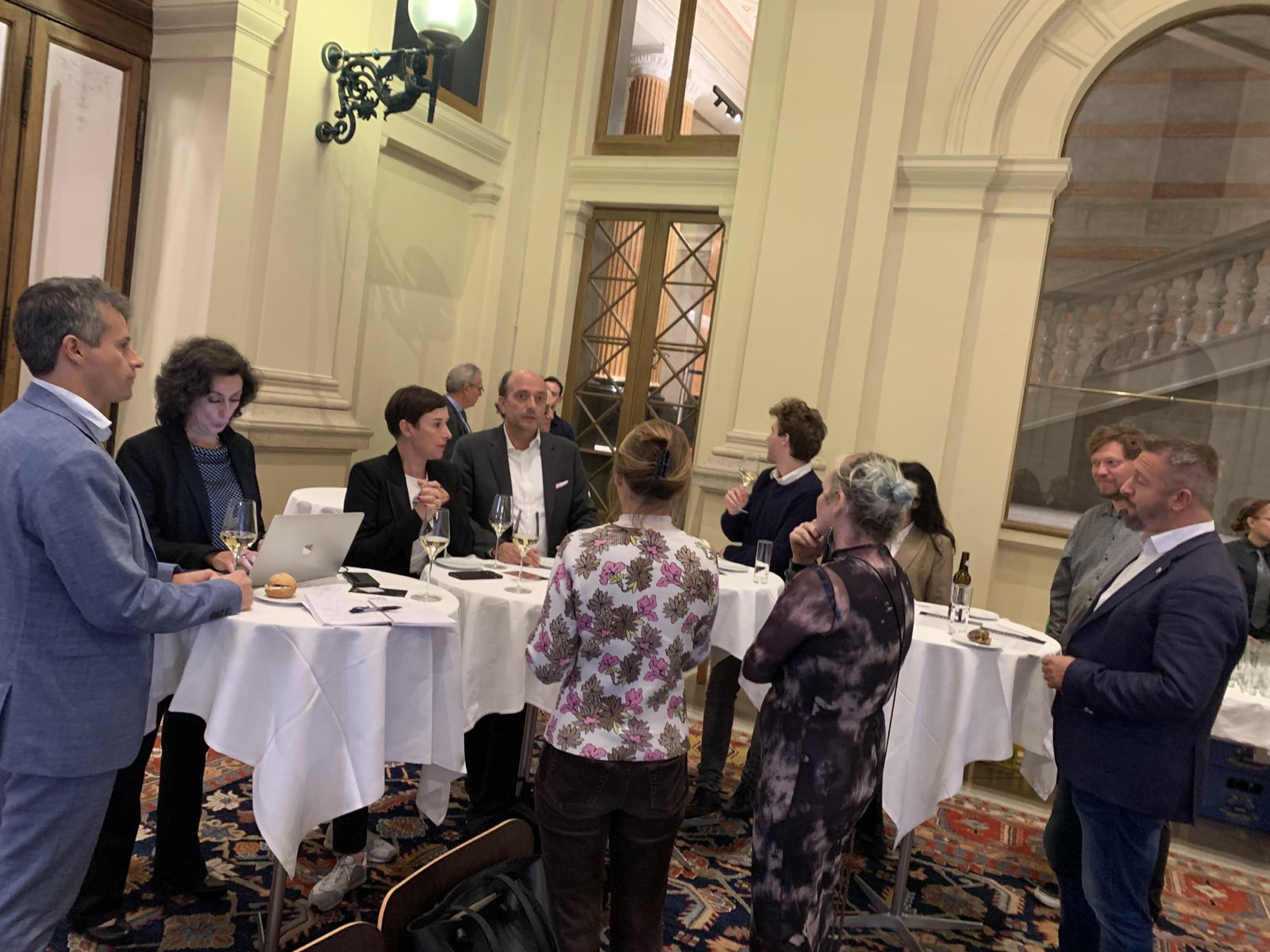Connecting Citizens and Cities via Digital Tools
Official side event of the European week of regions and cities
The panel discussion was moderated by Stefan Sindelar (ECoD), who briefly introduced the European Capital of Democracy Initiative and the concept of the Citizens’ Jury after welcoming the panelists:
Henrike Brandstötter, Author, fundraising expert and Member of Austrian Parliament
Dr. Stefan Gara, Entrepreneur & Member of Vienna City Council, focused on climate protection. He led the pioneer SMART Mobility Platform in Vienna, based on the participatory approach and focused on human needs.
The increasingly important role of digital tools for citizens’ involvement on the local level was stressed right at the beginning of the discussion, as well as globally increasing number of inhabitants without the right to vote, as Stefan Gara confirmed for the city of Vienna.
For that reason it is much more important to involve them through participatory democratic processes into political decision-making. Digital tools can bring people together and give them the chance to contribute to political decisions which also directly affect them.This is one of the main reasons why ECoD was initiated – namely to give people a voice. Bringing people together counters worrying social polarisation processes. Participatory initiatives such as participatory budgeting via digital tools can help bring people together, including people without the right to vote.
Some tools can be simple, but powerful – as the winner of the Democracy Innovation Award 2022 from Zimbabwe shows. Courteney MUKOYI from Zimbabwe, the founder of AstreaJustice, has developed a simple app to inform citizens about their constitutional rights to help them fight human rights violations and harassment in every day’s live.
Henrike Brandstötter mentioned a tool the City of Vienna developed a new Digi Platform called Jugendmillion (“Youth million”) to engage children and youth from 5-20 years in citizens’ participation. In cooperation with the Youth parliament, 60,000 youngsters joined this initiative and can initiate and give their say for projects to be realised.
Stefan Gara added the example of Amadeus International School in Vienna helping children and young adults with various backgrounds to develop their talents in music and arts.
Digital tools should be designed to promote democracy and inclusion. Hereby, transparency is the key for trust.
Stefan Gara
People must know what will happen with their personal data. In that sense, the newly launched principle of Digital Humanism puts people in the centre of design, so people of various ages, gender, backgrounds can participate in, and most importantly are motivated to join.
In Africa, digital tools just help people to organise their daily lives and arrange themselves with limited resources. So, currently digital innovation comes from the Global South. In Asia, however, people face the most developed technologies, but are much less democratically oriented, while product orientation prevails. In general, the decrease of trust is a problem which needs to be solved.
So, the question is how can the participatory approach help to gain citizens’ trust.
Stefan Sindelar
Austria proves to be a bad example, since it faces a broad corruption scandal and finds itself in the middle of unprecedented legal proceedings. As a matter of fact, people’s trust in politics, but also in the digital use of their data was deeply shaken. At the same time, fake news and conspicuous theories are a big problem. What is needed now is to rewind and start the whole process from the beginning. This means talking with people in person, because it is not a question of using digital tools, it is about citizens’ trust.
Citizens to be actively reached out and listened to.
Henrike Brandstötter
Stefan Gara stressed that we need are clear transparency rules and procedures and on the other hand digital literacy, because education is the basis of that all. This is the reason why young people have to be involved in political processes from an early age to learn what democracy means.
There is a clear difference between freedom of speech and freedom of reach.
Stefan Gara
Freedom of speech leads to freedom of press and to the question who is the gatekeeper to control the access to public discourse. Regarding Social Media all these questions fall apart, because everything is about freedom of reach without any regulations. That all makes transparency most important, because otherwise we lose the game. It is not normal that for instance Russian agents are engaged in US elections undercover. We have a global problem which needs global solutions.
Media literacy, which is highly important, drifted away in the Covid-19 pandemic situation.
Henrike Brandstötter
Direct discussions with citizens on the local level are a possibility to meet the needs and concerns of the people, and broaden political decision-making, because then all political representatives, regardless of their party orientation have to take these exchange processes into account of their decisions.
Digital Humanism ensures that technology development remain centered on human interests. Thus, data security is integral to the design of digital applications.
Stefan Gara
For Stefan Gara, the Vienna Climate team is a Good Practice example of participatory budgeting on a communal level. As a governance innovation initiative, it started this year and involves people regardless of their backgrounds to shape their districts. On a district map people can put their climate protection ideas, experts check if these ideas are implementable, and if finally chosen, the ideas will be realised in cooperation with the city administration.
What proves to be a challenge with all participatory initiatives is the individual access which is not only a question of media literacy, but also language as such.
Stefan Sindelar
For that reason, the ECoD initiative uses Standard English to involve as many citizen jurors as possible across all Council of Europe member states.
Many young people are very talented in using digital tools, but often miss out the broader context. From an intergenerational point, this is not always easy to understand.
Henrike Brandstötter
With the network of 10,000 European citizens – the ECoD Citizens’ Jury – we will be exchanging with as many different people as possible, motivating them to share their views and ideas through digital tools and fostering participatory democracy together.

An engaged exchange, online and offline
The panel discussion was continued via inspired digital and physical table talks. Participants agreed that education, personal relations and networks, space and access to information are the sine-qua-non conditions for citizens’ engagement. They further showed worrying about the access to space and information for marginalised groups, and highlighted the importance of a broader sensitivity when involving diverse people, and people with special needs. Open spaces and information which is easy to understand is crucial for citizens’ involvement.
As a good practice example, the Vienna Open Lab for children and youth was further discussed as well as other initiatives of citizens’ involvement on local level and via digital tools, as more participants could share their experience, also from a professional point of view, for instance In terms of life-long-learning, neurodiversity, fine arts, and non-formal educational offers for children and youth.
One of the main findings of the discussions was that there lies a big potential in digital tools to foster a barrier free citizens’ involvement in decision-making and citizens’ engagement in social life.
